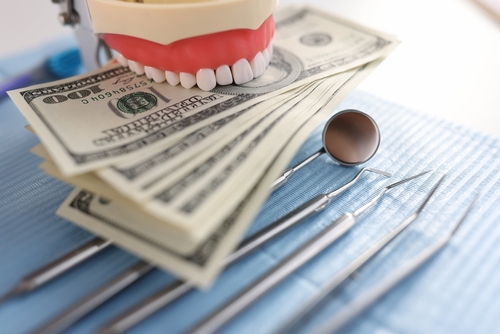When it comes to major purchases, savvy consumers are always on the lookout for discounts and bargains. How often have you seen sale offers like these: Buy one, get one free! Zero money down! Earn double shopper’s points! Buy nine sandwiches, and get the tenth free! Unfortunately, in the world of major medical procedures, there’s usually no rewards card or shopper’s club that will get you a discount on your treatment. However, there’s another way to receive money back for choosing to restore missing teeth. Dental implants can be tax deductible if you meet the correct parameters, making a significant investment more financially palatable.
Explaining Dental Implants
 Dental implants and mini dental implants have revolutionized how we replace missing teeth. They’re small but sturdy titanium posts, carefully placed into the jawbone by an implant dentist like Dr. Zirakian. Over time, the implants fuse with the bone, providing a stable foundation for artificial teeth. Some of the benefits of choosing dental implants over other tooth replacement options include:
Dental implants and mini dental implants have revolutionized how we replace missing teeth. They’re small but sturdy titanium posts, carefully placed into the jawbone by an implant dentist like Dr. Zirakian. Over time, the implants fuse with the bone, providing a stable foundation for artificial teeth. Some of the benefits of choosing dental implants over other tooth replacement options include:
- Natural feel and appearance: Teeth supported by dental implants more closely mimic your natural teeth than bulky traditional dentures.
- Improved speech and comfort: Unlike traditional dentures, implants won’t lose their grip and slip around in your mouth.
- Stronger bite force: Bite into your favorite foods with confidence once again. Implants restore your bite power, making eating a pleasure again and allowing you to enjoy a more nutritious diet.
- Preserved jawbone health: Implants don’t require you to alter neighboring teeth like crowns and bridges, keeping more of your natural tooth structure. They also prevent jawbone deterioration, maintaining facial structure.
- Better durability and reliability: With proper care, implants can last a lifetime. They’re a longer-lasting solution for tooth loss than other options.
- Boosted self-esteem: Implants restore your smile and the functionality of your teeth, improving self-confidence. Thanks to a stable set of new teeth, you’ll feel better about how you look and feel.
How Are My Dental Implants Tax Deductible?
Your dental implants fall under IRS Topic No.502, Medical and Dental Expenses. This topic states that expenses for “false teeth” qualify as “payments for treatments affecting any structure or function of the body,” meaning that you can deduct a portion of your dental implant expenses from your taxes.
Before we begin, here are a few qualifications. First, you must itemize your deductions to claim your implant expenses. If you’re used to filing the Standard Deduction and aren’t sure how to itemize your deductions, we highly recommend seeking the help of a certified tax professional. Second, you cannot claim any part of your implant expenses paid for by insurance or a Health Savings Account, so subtract that amount from your total expenses before you begin. Finally, you need to know your Adjusted Gross Income. If you’re unsure how to calculate your AGI, here is a helpful explanation. Your AGI can also be found on Line 11 of Form 1040 on your taxes.
Making the Calculation
Determining your deduction is fairly straightforward once you have all the information above.
- Calculate 7.5% of your Adjusted Gross Income. This is the Minimum Threshold you must meet to claim your implant expenses.
- You remembered to remove any insurance or HSA payments from your Implant Expenses, right?
- The final calculation is Implant Expenses – Minimum Threshold = Your Eligible Deduction.
For example, let’s say your Implant Expenses after insurance and HSA payments are $15,000, and your Adjusted Gross Income is $50,000. Next, we calculate 7.5% of your AGI, which would be $3,750. This is the Minimum Threshold. Finally, after plugging the numbers into the formula, we get $15,000 – $3,750 = $11,250 as your eligible deduction. Remember, these numbers will change based on your individual expenses, insurance coverage, and AGI. Again, we recommend taking your taxes to a professional service if you’re unsure how to arrive at these numbers.
Other Financial Questions
Setting aside questions about tax deductions, we understand that a transformative procedure like this will always raise financial concerns. That’s why our experienced staff will work with you and your insurance company to maximize your coverage. We also partner with multiple financing companies and can point you toward a payment plan that will suit your budget.
Learn More About Tax Deductible Dental Implants
The best part about dental implants is how effectively they replace missing teeth. If you’re concerned about finances, the second best part might be that they’re tax deductible. If this option makes them more of a consideration, contact East Longmeadow Family Dental Center to schedule your free consultation. Dr. Zirakian and his dedicated staff are ready to show you the transformative power of dental implants.
